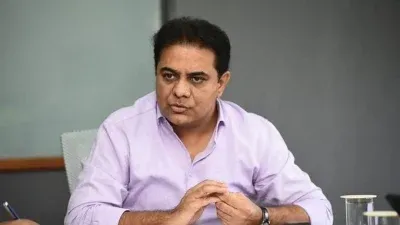KTR’s Critique of Congress: Alleged Double Standards on Adani
KTR, the Minister for IT and Industries in Telangana has recently criticized the Congress party for what he describes as double standards regarding the Adani Group. This essay aims to explore the nature of KTR’s allegations, the context surrounding them, and the broader implications for political discourse in India.
Table of Contents
Context of the Allegations
KTR’s remarks come against a backdrop of ongoing political debate and scrutiny surrounding the Adani Group, a major conglomerate with interests spanning various sectors including energy, infrastructure, and logistics. The Congress party has been vocal about its concerns regarding the business dealings of the Adani Group, often accusing the government of favoritism and lack of transparency. KTR’s critique highlights a perceived inconsistency in Congress’s stance on the Adani Group.
KTR’s Critique
KTR’s central argument is that Congress’s position on Adani has been inconsistent, depending on the political landscape and strategic interests. He asserts that while Congress has criticized the ruling party for alleged preferential treatment towards Adani, it has simultaneously maintained close relationships with the conglomerate when in power or seeking political favor. KTR argues that this duality undermines the credibility of Congress’s criticism and suggests a politically motivated agenda rather than a genuine concern for corporate governance.
Double Standards: A Closer Look
KTR’s assertion of double standards involves several key points:
- Historical Alliances: KTR points out that Congress has had past associations with the Adani Group, including instances where Congress-led governments allegedly supported or engaged with the conglomerate. He argues that the current criticism from Congress should be viewed in the context of these historical ties, suggesting that the party’s current stance may be influenced by political expediency rather than principle.
- Policy Shifts: The critique also extends to how Congress’s policy positions have evolved over time. KTR claims that the party’s criticism of the Adani Group has fluctuated, aligning with its political positioning and strategic goals. This, according to KTR, reflects a lack of consistency in Congress’s approach to corporate ethics and governance.
- Political Opportunism: KTR argues that Congress’s criticism is not solely about corporate malfeasance but also about leveraging the issue to undermine the current government. He suggests that the party’s focus on Adani is part of a broader strategy to mobilize voter sentiment against the ruling party, rather than addressing the issue of corporate governance in a constructive manner.
Broader Implications
The debate over KTR’s critique of Congress’s double standards raises several broader issues:
- Political Discourse: The allegations reflect the polarized nature of political discourse in India, where accusations and counter-accusations are common. This polarization often leads to questions about the sincerity of political critiques and the extent to which they are driven by genuine concerns versus strategic interests.
- Corporate Governance: The focus on the Adani Group highlights ongoing concerns about corporate governance and the role of large conglomerates in Indian politics. The debate underscores the need for transparency and accountability in both corporate and political spheres.
- Public Perception: KTR’s comments contribute to shaping public perception of the Congress party and its political strategies. Such critiques can influence voter attitudes and perceptions of political integrity, impacting electoral outcomes and party reputations.
Conclusion
KTR’s critique of Congress for alleged double standards on Adani provides a detailed examination of political and corporate interactions in India. By highlighting inconsistencies in Congress’s stance and suggesting a politically motivated agenda, KTR aims to challenge the credibility of the party’s criticisms. This debate not only underscores the complexities of Indian politics but also reflects broader concerns about corporate governance and political integrity. As political narratives continue to evolve, it remains crucial for all parties to address such issues with transparency and consistency, ensuring that public discourse is informed and constructive.








